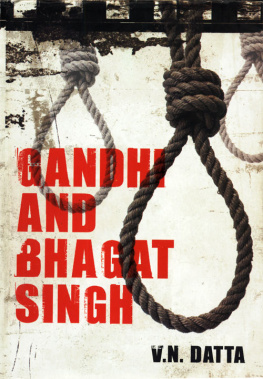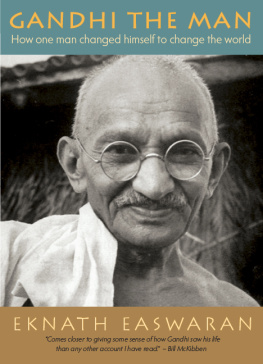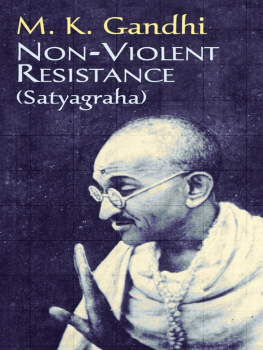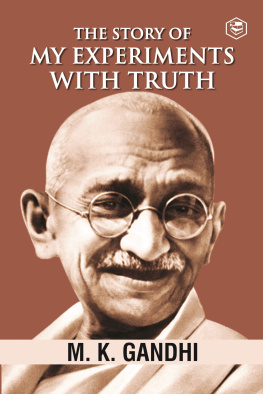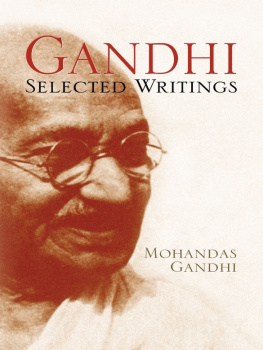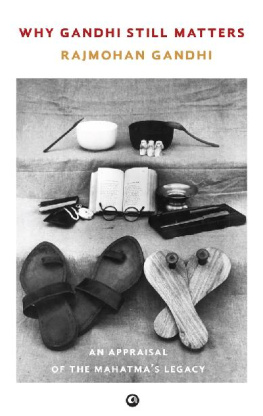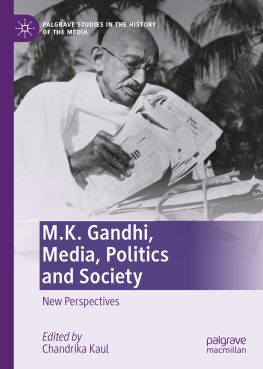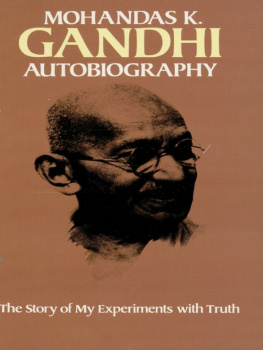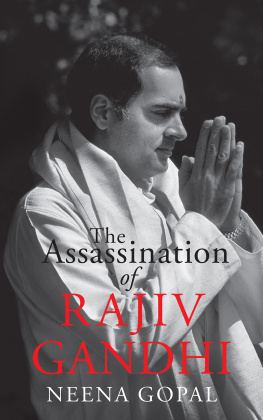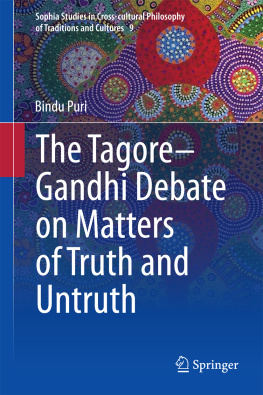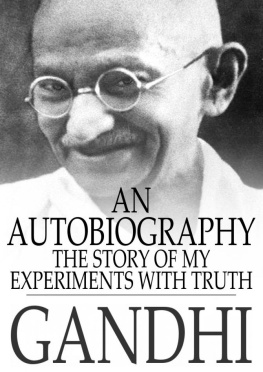Gandhi - Gandhi and Tagore: politics, truth and conscience
Here you can read online Gandhi - Gandhi and Tagore: politics, truth and conscience full text of the book (entire story) in english for free. Download pdf and epub, get meaning, cover and reviews about this ebook. City: India, year: 2016, publisher: Taylor & Francis (CAM);Routledge;Taylor & Francis Group, genre: Politics. Description of the work, (preface) as well as reviews are available. Best literature library LitArk.com created for fans of good reading and offers a wide selection of genres:
Romance novel
Science fiction
Adventure
Detective
Science
History
Home and family
Prose
Art
Politics
Computer
Non-fiction
Religion
Business
Children
Humor
Choose a favorite category and find really read worthwhile books. Enjoy immersion in the world of imagination, feel the emotions of the characters or learn something new for yourself, make an fascinating discovery.
- Book:Gandhi and Tagore: politics, truth and conscience
- Author:
- Publisher:Taylor & Francis (CAM);Routledge;Taylor & Francis Group
- Genre:
- Year:2016
- City:India
- Rating:5 / 5
- Favourites:Add to favourites
- Your mark:
- 100
- 1
- 2
- 3
- 4
- 5
Gandhi and Tagore: politics, truth and conscience: summary, description and annotation
We offer to read an annotation, description, summary or preface (depends on what the author of the book "Gandhi and Tagore: politics, truth and conscience" wrote himself). If you haven't found the necessary information about the book — write in the comments, we will try to find it.
Gandhi: author's other books
Who wrote Gandhi and Tagore: politics, truth and conscience? Find out the surname, the name of the author of the book and a list of all author's works by series.
Gandhi and Tagore: politics, truth and conscience — read online for free the complete book (whole text) full work
Below is the text of the book, divided by pages. System saving the place of the last page read, allows you to conveniently read the book "Gandhi and Tagore: politics, truth and conscience" online for free, without having to search again every time where you left off. Put a bookmark, and you can go to the page where you finished reading at any time.
Font size:
Interval:
Bookmark:

This book brings together the political thought of Gandhi and Tagore to examine the relationship between politics, truth and conscience. It explores truth and conscience as viable public virtues, with regard to two exemplars of ethical politics, addressing in turn the concerns of an evolving modern Indian political community.
The comprehensive and textually argued discussion frames the subject of the validity of ethical politics in inhospitable contexts, such as the fanatically despotic state and energised nationalism. The book studies in nuanced detail Tagores opposition to political violence in colonial Bengal, the scope of non-violence and satyagraha as recommended by Gandhi to Jews in Nazi Germany, his response to the complexity of protest against the Jallianwala Bagh massacre and the differently constituted nationalism of Gandhi and Tagore. It presents their famous debate in a new light, embedded within the dynamics of cultural identification, political praxis and the capacity of a community to imbibe the principles of ethical politics.
Comprehensive and perceptive in analysis, this book is a valuable addition for scholars and researchers of political science, with specialisation in Indian political thought, philosophy and history.
Gangeya Mukherji is Reader in English at Mahamati Prannath Mahavidyalaya, Mau-Chitrakoot, Uttar Pradesh, India.
GANGEYA MUKHERJI

First published 2016
by Routledge
2 Park Square, Milton Park, Abingdon, Oxon OX14 4RN
and by Routledge
711 Third Avenue, New York, NY 10017
Routledge is an imprint of the Taylor & Francis Group, an informa business
2016 Indian Institute of Advanced Study (IIAS), Shimla
The right of Gangeya Mukherji to be identified as author of this work has been asserted by him in accordance with sections 77 and 78 of the Copyright, Designs and Patents Act 1988.
All rights reserved. No part of this book may be reprinted or reproduced or utilised in any form or by any electronic, mechanical, or other means, now known or hereafter invented, including photocopying and recording, or in any information storage or retrieval system, without permission in writing from the publishers.
Trademark notice: Product or corporate names may be trademarks or registered trademarks and are used only for identification and explanation without intent to infringe.
British Library Cataloguing-in-Publication Data
A catalogue record for this book is available from the British Library
Library of Congress Cataloging-in-Publication Data
A catalog record has been requested for this book.
ISBN: 978-1-138-94617-0 (hbk)
ISBN: 978-1-315-67097-3 (ebk)
Typeset in Adobe Garamond Pro
by Apex CoVantage, LLC
Dedicated to
Manas Mukul Das
Rama Charan Tripathi
Sibesh Chandra Bhattacharya
I t is not often that one gets the privilege and the pleasure of writing a foreword for a book in the history of ideas. The privilege comes from being given an early glimpse of the four conversations that Gangeya Mukherji has staged of the intellectual life of early twentieth-century India. These are first that between Indian thinkers and social reformers primarily of Bengal and the thought traditions of ancient India; second, internally between this group of thinkers themselves on what they regard as the sources of the problems that confront India and on the different ways that each suggests for the country to move forward; third, between these thinkers and their contemporaries in the West, especially those in Europe, where the formulation of the question itself is to be argued over (What does it require to be modern? What should modernity look like in India?); and fourth, between thinkers across the globe of the contemporary that Gangeya holds can shed light during his elaboration of an idea that was first articulated in an earlier historical period. For example, he believes Bernard Williams must intrude in a conversation between Tagore and Gandhi on truth and politics because he has something valuable to offer. And from the argument as it develops intrude he must.
These are the four conversations that take place concurrently in the book as Gangeya has thinkers from the past speak to the future and also, in reverse, thinkers from the present speak to the past. His discussion of the ideas of Bankim, Vivekananda, Tagore and Gandhi and some others that emerge in the book is fascinating not just because it illumines the concerns of the period but also because it invites us to distinguish between concerns that have only period relevance from those that are more perennial. As an able interlocutor, Gangeya introduces their ideas on ethics and politics and also interrogates them from several vantage points. In the process, he entices the reader to enter a world of our recent past where some of Indias public intellectuals to use a modern descriptor which I feel is not out of place for that period articulated a dream of Indias post-colonial future. When in my opening statement I had said it was a privilege to write this foreword, it was for the privilege of this early glance was what I was referring to.
The pleasure, however, comes from a different direction. Gangeyas work that I have had the opportunity to read, over the last six years, has in these years freed itself from what I would like to call an exegetical diffidence and has evolved into one that I can best describe as exegetical expansiveness. His idiom and conceptual vocabulary has come into its own. This, I believe, is indicative of the maturation of his ideas. He does not now seek to include every comment that he finds interesting a problem that many of us struggle with and few can overcome but allows his judgement to decide what to exclude and what to include in his analysis. As a consequence, the text does not become overloaded. This is a tough call, and only those who have developed their own social philosophy can display such confidence especially when the interlocution is with deep thinkers such as Gandhi and Tagore. As a result, the text shows a maturity of understanding that one begins to admire and I daresay sometimes even envy. (I wish I had thought of that connection!) In this book, one can see Gangeyas deep and continuous engagement with the antinomies of the human condition. While his scholarship, even in the past, was never in doubt, given the expanse of his reading, this work places him in a select scholarly circle that only those who first strictly follow classical protocols of first mastering the text to be discussed, then locating it in its social and intellectual context, then identifying possible persons it can speak to, and finally elaborating extensively on its concerns, are admitted. In this book, Gangeya has earned his place in that select circle. This is what gives me so much pleasure.
Having offered my understanding of the large canvass of the book, let me now engage with some of the ideas expressed in it. Since I have no intention of presenting a synopsis of the chapters one has to savour each section for oneself let me instead respond to three ideas from the book. The first is his borrowing Hannah Arendts phrase dark times to refer to a period when the moral fabric of a society is under stress, and perhaps worse, under threat. Gangeya believes that the time of Tagore and Gandhi was such a dark time when they were called upon to defend the moral fabric of Indian society. His adoption of this term to describe the period is attractive because it not only connects with the changes taking place in Europe, during the same period, but it also brings into the centre of our discussion the ethical element in politics. He holds that a time when it is believed that there is a basic contradiction between politics and truth is a period that portends ill for the polity. He seems to suggest, ever so subtly, that in our own times the belief in the public discourse is of the existence of such a contradiction. Does he wish to warn us that we are entering a period of dark times? Rather than view this as a warning, I would like to see it as an invitation to study the ideas of the intellectual stalwarts of an earlier age who too struggled with questions similar to the ones that we are struggling with but who responded to them in creative ways. They were always mindful of the need to align their commitment to the ethical with their desire for social and political transformation. In their vision of the future, ethics and politics were aligned. Engaging with the ideas of this period would help us enormously in finding ways to think through the problems of India today. This is the value of the book.
Font size:
Interval:
Bookmark:
Similar books «Gandhi and Tagore: politics, truth and conscience»
Look at similar books to Gandhi and Tagore: politics, truth and conscience. We have selected literature similar in name and meaning in the hope of providing readers with more options to find new, interesting, not yet read works.
Discussion, reviews of the book Gandhi and Tagore: politics, truth and conscience and just readers' own opinions. Leave your comments, write what you think about the work, its meaning or the main characters. Specify what exactly you liked and what you didn't like, and why you think so.

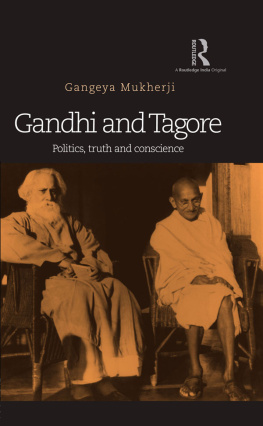
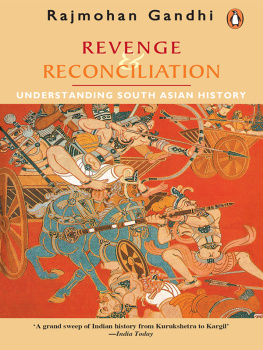
![Gandhi - Gandhi: [the true man behind modern India]](/uploads/posts/book/175484/thumbs/gandhi-gandhi-the-true-man-behind-modern-india.jpg)
